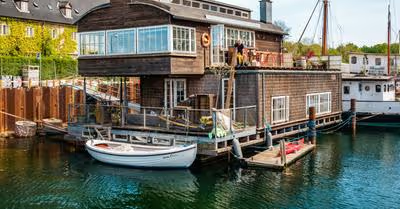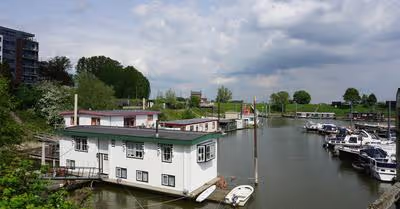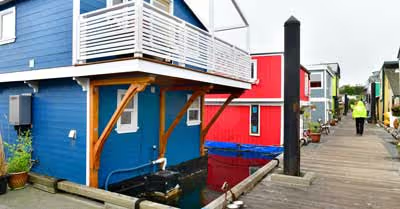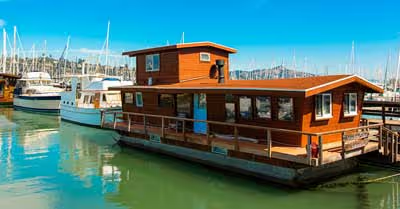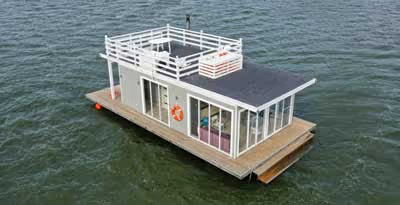
Key Takeaways
- Consider purpose, location, and budget when choosing a houseboat.
- Inspect thoroughly and hire a surveyor to assess the vessel's condition.
- Explore financing options and secure insurance coverage for your investment.
- Research mooring options and ensure compliance with regulations.
- Implement regular maintenance to preserve the longevity of your houseboat.
Dreaming of life on the water? Learn how to navigate the exciting journey of purchasing your very own houseboat.
To buy a houseboat, start by researching models and sizes that suit your needs. Consider factors like budget, location, and maintenance costs. Hire a surveyor to inspect the boat's condition thoroughly. Secure financing for the purchase. Finally, negotiate the price and finalize the transaction.
With over a decade of navigating the waters and owning multiple houseboats, I bring firsthand expertise to your houseboat journey. As your trusted advisor, I'll share insider tips and expert opinions to ensure your purchase is smooth sailing. Trust in my experience; let's embark on this adventure together!
How to Buy a Houseboat
The gentle sway of the waves beneath you, the sun casting a golden hue across the horizon, and the freedom to call the water your home. Welcome to the world of houseboats—a unique blend of adventure and tranquillity that beckons to those seeking a life less ordinary. But before you set sail on this exciting journey, it's essential to navigate the waters of purchasing your very own floating abode.
From understanding the intricacies of different models to negotiating the best deal, there's much to consider. As an expert with years of firsthand experience and a passion for all things maritime, I'm here to guide you through the process, ensuring your transition to houseboat living is as seamless as a calm day on the lake.
Research Houseboat Models and Sizes
When embarking on the journey to purchase a houseboat, it's crucial to begin by researching the various models and sizes available. Houseboats come in a range of types, including pontoon boats, cruisers, and house barges, each offering distinct features and amenities.
Consider your specific needs and preferences, such as the number of bedrooms, living space, and onboard facilities, to determine the most suitable model for your lifestyle. Take the time to explore different options thoroughly, comparing layouts, designs, and capacities to find the perfect fit for your floating home.
Determine Budget and Location Preferences
Before diving into the houseboat market, it's essential to establish a clear budget and identify your preferred locations for mooring or cruising. Assess your financial situation to determine how much you can comfortably afford to spend on purchasing and maintaining a houseboat.
Additionally, think about where you envision spending time on your houseboat—whether it's a tranquil lake, a bustling marina, or coastal waters—to narrow down your search and focus on suitable locations.
Consider Maintenance Costs
Owning a houseboat involves ongoing maintenance to keep it in good condition and ensure safe and enjoyable voyages on the water. Before finalizing your purchase decision, take the time to research and understand the maintenance costs associated with owning a houseboat.
This includes regular servicing of the engine and mechanical systems, hull maintenance, interior repairs, and other upkeep tasks. Factor these expenses into your budgeting to ensure you can afford the necessary maintenance to keep your houseboat shipshape for years to come.
Hire a Marine Surveyor
Engage the services of a qualified marine surveyor to conduct a comprehensive inspection of the houseboat. A marine surveyor will thoroughly assess the vessel's condition, including its structural integrity, mechanical systems, and compliance with safety standards.
Obtain Financing or Savings
Once you've found the perfect houseboat and assessed its condition, it's time to secure financing or utilize your savings for the purchase. Explore financing options such as marine loans, personal loans, or home equity loans to determine the most suitable solution for your financial situation. Alternatively, if you have sufficient savings, you may choose to fund the purchase outright.
Negotiate Purchase Price
Negotiating the purchase price is a crucial step in the houseboat-buying process. Armed with knowledge about the market value of similar vessels and any potential repair or maintenance costs identified during the inspection, enter into negotiations with the seller. Be prepared to make a reasonable offer based on the boat's condition and market factors, and don't hesitate to negotiate terms such as price adjustments or included accessories to reach a mutually beneficial agreement.
Finalize Transaction with Legal Contract
Once you've agreed on the purchase price and terms with the seller, it's essential to finalize the transaction with a legally binding contract. Consult with a maritime attorney or legal expert to draft a purchase agreement that outlines all relevant details, including the sale price, deposit amount, inspection contingencies, closing date, and any other conditions or provisions.
Review the contract carefully to ensure clarity and accuracy, seeking clarification on any terms that may be unclear or require further explanation. Once both parties have signed the contract, you can proceed with confidence, knowing that your houseboat purchase is secure and legally binding.
Unique Features to Consider in Your Houseboat Purchase
As you embark on the exciting journey of purchasing a houseboat, it's essential to explore beyond the basics and discover the hidden gems that can elevate your floating abode to new heights of comfort, convenience, and enjoyment.
In this section, we'll delve into some unique features and considerations that you may not have even known existed but could make all the difference in your houseboat ownership experience.
Solar Power Integration
Consider incorporating solar power into your houseboat's energy system. Solar panels can provide a sustainable and environmentally friendly source of electricity, reducing reliance on traditional power sources and lowering energy costs.
With advancements in solar technology, it's now easier than ever to install solar panels on houseboat roofs or decks, harnessing the power of the sun to keep your onboard systems running smoothly.
Customized Layout and Design
Think beyond cookie-cutter layouts and explore the possibilities of customizing your houseboat's interior layout and design. From modular furniture and multi-functional spaces to custom cabinetry and luxury finishes, the sky's the limit when it comes to tailoring your floating home to suit your unique tastes and lifestyle.
Work with experienced designers and craftsmen to bring your vision to life and create a truly personalized living space that reflects your individuality and enhances your onboard experience.
Smart Technology Integration
Embrace the convenience of smart technology by integrating smart home systems into your houseboat. From automated lighting and climate control to remote monitoring and security systems, smart technology can enhance comfort, efficiency, and safety onboard. Imagine being able to adjust temperature settings, monitor energy usage, and even control entertainment systems with the touch of a button or voice command, all from your smartphone or tablet.
Water Recreation Amenities
Transform your houseboat into the ultimate waterfront retreat by incorporating water recreation amenities that cater to your favorite activities and hobbies. Whether you're a fishing enthusiast, water sports aficionado, or simply enjoy lounging by the water, consider adding features such as fishing platforms, swim platforms, waterslides, or even jacuzzi tubs to enhance your onboard leisure experience. With the right amenities, every day on your houseboat can feel like a vacation.
Green Initiatives and Eco-Friendly Practices
As stewards of the waterways, consider implementing green initiatives and eco-friendly practices onboard your houseboat. Explore options such as composting toilets, rainwater harvesting systems, and environmentally conscious cleaning products to minimize your environmental footprint and preserve the natural beauty of the waters you call home.
Frequently Asked Question
Navigating the waters of houseboat ownership comes with its share of questions; here are some frequently asked questions (FAQ) to guide you through the process with confidence.
What factors should I consider when choosing a houseboat?
When selecting a houseboat, several factors come into play. Firstly, think about your intended use—are you looking for a permanent residence, a vacation home, or a recreational vessel? Consider the size, layout, amenities, and mobility options that best suit your needs and preferences. Location is also crucial; think about climate, water depth, access to amenities, and regulations governing mooring.
How do I finance the purchase of a houseboat?
Financing options for houseboats are similar to those for traditional homes. You can explore loans from banks, credit unions, or marine finance companies. The terms and rates may vary, so shop around for the best deal. Additionally, some sellers may offer financing options or lease-to-own arrangements. If you have substantial savings, you might opt to purchase the houseboat outright.
What should I look for during a houseboat inspection?
During a houseboat inspection, it's crucial to assess both the structural integrity and the functional aspects of the vessel. Look for signs of wear and tear, such as cracks, leaks, or corrosion, especially in critical areas like the hull, decking, and engine compartments. Test all onboard systems, including electrical, plumbing, and mechanical components, to ensure they are in proper working order.
What insurance do I need for my houseboat?
Houseboat insurance typically includes coverage for damage, theft, liability, and medical payments. You'll want to ensure your policy provides adequate protection for the value of your vessel, as well as any liability risks associated with operating it. Additional coverage options may include protection against natural disasters, environmental damage, or towing assistance.
How do I find mooring or docking space for my houseboat?
Finding mooring or docking space for your houseboat requires careful consideration of location, amenities, regulations, and availability. Start by researching marinas, ports, or waterfront communities in your desired area. Contact marina operators or harbor masters to inquire about mooring options, fees, and any requirements or restrictions.
What ongoing maintenance is required for a houseboat?
Regular maintenance is essential to keep your houseboat in top condition and ensure its longevity. This includes routine tasks such as cleaning, painting, and lubricating moving parts. Inspect the hull, decking, and mechanical systems regularly for signs of wear or damage, and address any issues promptly to prevent further deterioration.



